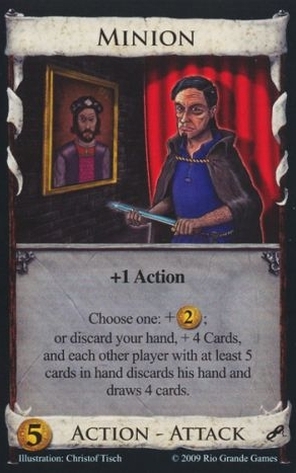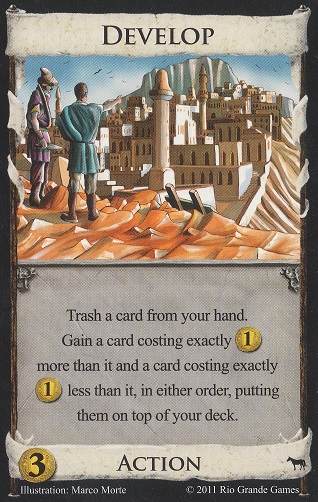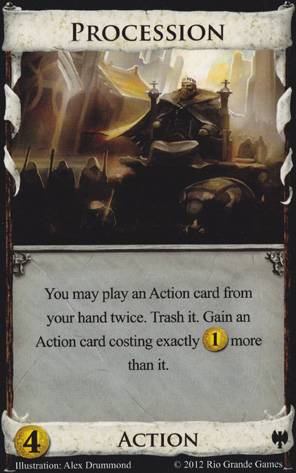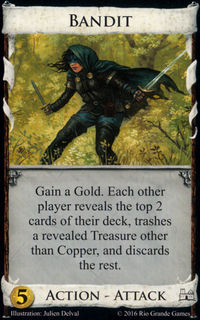*in my opinion.
I'm sure you've been there too; you load up a game or deal out 10 blue-backed cards and see your one personal rectangular nemesis that makes you think "Oh crap. I'm not winning this game" (Just me?)
Anyways, these are the cards that I feel separate the Dominion Greats from the Not-So-Greats. (It's also a little bit of "Teach me how to play better please" disguised as a clickbait article).
This isn't a list of the best cards in Dominion - Chapel's great, but it doesn't take too long to learn how important it is to trash your whole hand. It's also not a list of the cards whose strategies are easy to get, hard to perfect - you might've played your Rebuild or Governor deck slightly better than I did and won, but at least I understand the general principles of them. Also not a list of those cards with those obscure edge case strategies that are easily overlooked in favor of classic engines/BM - it sucks you beat me with that Counting House combo, but 99 times out of 100, there's no way it's worth it.
So without further ado, these are the cards with the what/why/when/how/where/who that need a lot of practice (still in my opinion).
Honorable Mentions
Distant Lands - Many have asked the question, few have found the answer: WHEN do I start picking up these cards with this really awesome color scheme?
Duke - OK, like most other pure victory cards, I kinda forget about it until the late game. I'm not great at looking at a board in the beginning and evaluating how Duke/Duchy stacks up with Province.
Groundskeeper - Surprisingly, the only Empires card that made it even to HM for me, though a few others were close. It can be game changing at the end, but like Distant Lands, 'when' is the question. Too useless early, too late...late. And yes, gainers are an obvious solution, but without gainers, picking up a G-Keeper in the midgame over other $5s is a tough choice.
Highway - ...and other cost reducers. Less about me and more for the general public, I feel like I have a pretty good grasp of most of Highway's tricks. What I don't have, however, is a good recognition of Highway's 'countertricks' (oh yeah, THAT'S why my Apprentice isn't working).
Watchtower - A cute little helper card, obviously not a powerhouse nor a card you need a lot of it, but it can do 3 separate cool things, all of which are easy to both forget about and underrate. I don't know, I feel like this is a really forgettable card for some reason, but it's usually a very useful one.
10. Tactician
When you start playing Dominion the thought process associated with Tactician goes: (see it for the first time) "Discard your hand? Ewwww" (sees somebody else use it) "+5 cards, + 1 action + 1 buy? That was awesome!" (and then more uses) "Eh".
Funny enough, Double Tactician is one of the coolest uses of Tactician, and yet, it's also not too tough to see when and why it works. It's the Single Tactician deck that's more gray area - Yes, 1 great turn is usually better than 2 good ones, but how good are those good turns I'm having, and how great is that one great one? It's that middle ground where I have a tough time seeing if sacrificing a turn is really worth it.
9. Minion
OK, fine, this one's a personal vendetta - I just can't win with Minion on the board. I can't. Minion stack is great, I was told, it's self-sufficient, I was told, and yet, there's so many cards that can combo well with Minion that I'm not aware of. In addition, I have a tough time with the main discard/+$ decision of Minion. When it's the last card left, sure, discard and get 4 new ones, but when you only have 5 total Minions in your deck, it's tough to get them to line up right.
8. Hermit
Maybe another card that is more personal, one that I don't really get...but I don't really get it. I remember watching a game from someone (I think it was Mic, could be wrong), where they butchered Coppers into Curses just to feed them to the Hermit. Yes, I see it's a nice counter to Looters and Curses, but it's still only one card you can trash, not to mention it doesn't work on treasures. As for Madman, sure it's great, but it's a 1-time use, plus you might have to sacrifice a solid turn in order to get it. I've seen games of people going after Hermits hard, and I don't see the purpose of having a bunch of them. Again, maybe this card is more of a personal sob story than one that accurately reflects the community's feelings....then again, it's my list, I can do what I want.
 7. Transmogrify
7. Transmogrify
So here's what I know how to use Transmogrify for:
1) It can turn Estates into Silvers for some nice early game usage
2) It can turn Provinces into Provinces to help end the game faster
3) ....some other stuff
Transmogrify is nice with Summon, it's great with Fortress, but it's easy to let it sit on your mat and not feel like using it. It's a card that can be used to help smooth out rough turns and give you power to kick off, but I imagine a lot players don't see a lot of immediate gain from it and pass it up for other $4's that can give an instant impact/direct contribution to an engine. It's easy to imagine that tricks exist with Transmogrify, harder to spot, much less practice, those tricks in an actual game.
6. Stonemason
So it took me a while to figure out why this card is considered so good. It can gain things, it goes great with potion-cost cards...but still, it's a dead card whose trashing ability just isn't that good. Depending on the board, there is a point where too many Stonemasons are detrimental.
I feel like I've started to get away from the whole purpose of this topic, so I'm gonna try to get back on track here: why does this card separate good from great players when it's buy ability isn't too difficult to figure out? Keyword(s): Endgame control. Stonemason both through buying and through trashing is possibly the best card at creating quick pile outs, and it's difficult for opponents to see it coming. Finding forced wins is a vital skill, and few cards better enable it than Stonemason.
5. Butcher
Good ol' Mr. My-Bald-Cap-Doesn't-Fit-So-Well-And-My-Ear-Is-A-Doorknob. Similar to Transmogrify in a lot of respects - trashing Estates into $3s and $4s is good early on, and endgame, it can drain Provinces quickly. And playing a Butcher just for the coin tokens is also a reasonable play. And then the questions come: When do you start burning those coin tokens? Is it worth to use 5 coin tokens turning a copper into a $5? Should I save them for later in the turn when I can use them with my multiple buys? When do I start turning my expensive actions and treasures into Provinces? Coin tokens are in general tough because it's a tough call when to use them, though the earlier the better is a good rule of thumb, but Butcher complicates the issue by giving you two different, useful ways to use coin tokens to get better cards.
4. Jack of All Trades
OK, I know what you're thinking: how the heck did this make the list, let alone get to 4? Haven't you heard of the fabled Double Jack, of whom many stories have been spread across the lands.
Why, yes, I do know of the legends! But do you mean to tell me that unless your deck contains 2 Jacks and a bunch of silvers that it's a useless card? The fact is Jack of All Trades is a jack of all trades. It does 4 things, each to be
utilized weaponized (I like that word better!) in their own way. And it seems to me the best players can spot when one or multiple of those abilities can be used to better an engine. Maybe it is a little high on the list but....eh, I'm committed. The 4-word card shall stay at #4!
3. Develop
Say what you want about the last 12 cards so far, I'm pretty confident in my choice for top 3. Starting with Develop. Gains a card costing more and less. There aren't that many cards that make you trash
backwards in cost, but here's one of 'em. It's a poor copper trasher, a mediocre estate trasher (at least you get a $3 on top of you deck), the real power lies in knowing when to get rid of those $4 and $5 Actions you worked oh so hard to get, just to feed them to the sinking sandcastle owned by an alien (seriously, why is his face GREEN‽‽‽‽). Again, maybe more of a personal issue, but I imagine a lot of players are reluctant to trash actions as 1) You bought them with your own hard-earned cash at some point and 2) and more importantly, it's tough to justify trashing over playing them.
But the flip side is you get two more cards, one of which is stronger than the trashee, plus you'll probably be playing them real soon, and adding engine cards to an engine is always smart. I haven't even mentioned endgame yet; you can use it to add some endgame victory cards and can get in some sneaky pileouts. Upon seeing the card for the first time, it should be obvious that there are tricks you can find with it, it's just a matter of managing to spot them and pull off a
https://www.youtube.com/watch?v=nmFb-BLxzpQ with it.
2. Procession
It's a Throne Room! It's an Upgrade! It's...Procession. Does it seem to strange to you that Procession is a Throne Room that improves the card you throne, gives you a chance to play that card on the same turn, costs the SAME as Throne Room, and despite all that, is still rated lower by the community. Huh? Well, the main reasoning isn't too hard to see it turns out - Throne Room can be used on your best, most expensive actions, while Procession...could technically too, it would just be dumb.
Regardless of how it stacks up against Throne Room, it's still a tough card to play right. On the face of it, even if you don't play the new card this turn, at least instead of paying $5 for the next card you need for your deck, you only need $4 to replace the card you just got rid of it. Frugality! Save a buck! Well, not so simple. Village/Terminal balance is key, and Procession can upset the balance. As with Develop, even when you're getting a more expensive card, it can still be discouraging to trash those o-so-precious Actions of yours.
But what really makes this card shine is when you Procession the Procession. Think about it for a couple seconds, and it's still not quite obvious what's gonna happen, even with just a chain of just 2, let alone 5. The endgame pileout the Processing a Processing a (insert recursion code here) enables is tough to underestimate unless you've done it yourself, or more likely, had it happen to you. So with both the ability to sacrifice actions for better ones and miraculously drain 3 piles like that, Procession is a well deserved #2.
And
1. Peasant and Friends
I hope you all saw this one coming. Countless articles have been written on Peasant and his 4 elders siblings, and yet, still we wander in the darkness, without a flicker of light to illuminate the proper way to play a game of Dominion with these sepia gentlemen. In a game where it's fun to find cards that thematically match what they do, perhaps no card better does this than Peasant: we Peasants don't know how to play with it, and must become the Teachers to master it.
In all seriousness - yeah, Peasant's tough. Where do I begin. How many Peasants should I get? How early should I fill my deck with these dead terminals? How many Disciples do I want? Which card should I Disciple? Do I even want a Teacher? What token do I place first? Which pile does it go on? Why am I placing my first token while my opponent just ended the game? (Been there, done that).
People have complained about Peasant ranking behind Page in the Qvist rankings. One of the main reasons (I think) Page has beaten Peasant two years is that people UNDERSTAND the Page chain. It's so beautifully intuitive! Champion stops attacks. Champion lets me ignore '+x Action'. The End. Heck, even Page is simpler than Peasant, it's just a $2 cantrip - what could be easier to get?
So yes, with a callback to the purpose of this article, when you play a game against me and Peasant is there, congrats on the victory.
Again, everything above is how I feel. I'm sure there are cards above that are much more obvious that I let them on to be and I'm just missing some simple fact about them. Those are just the cards that I see on boards that cause me to panic a little bit. I don't know, anybody else have thoughts/lists of their own? I decided to post this in General Discussion for a reason, so....Discuss! But do it generally...












